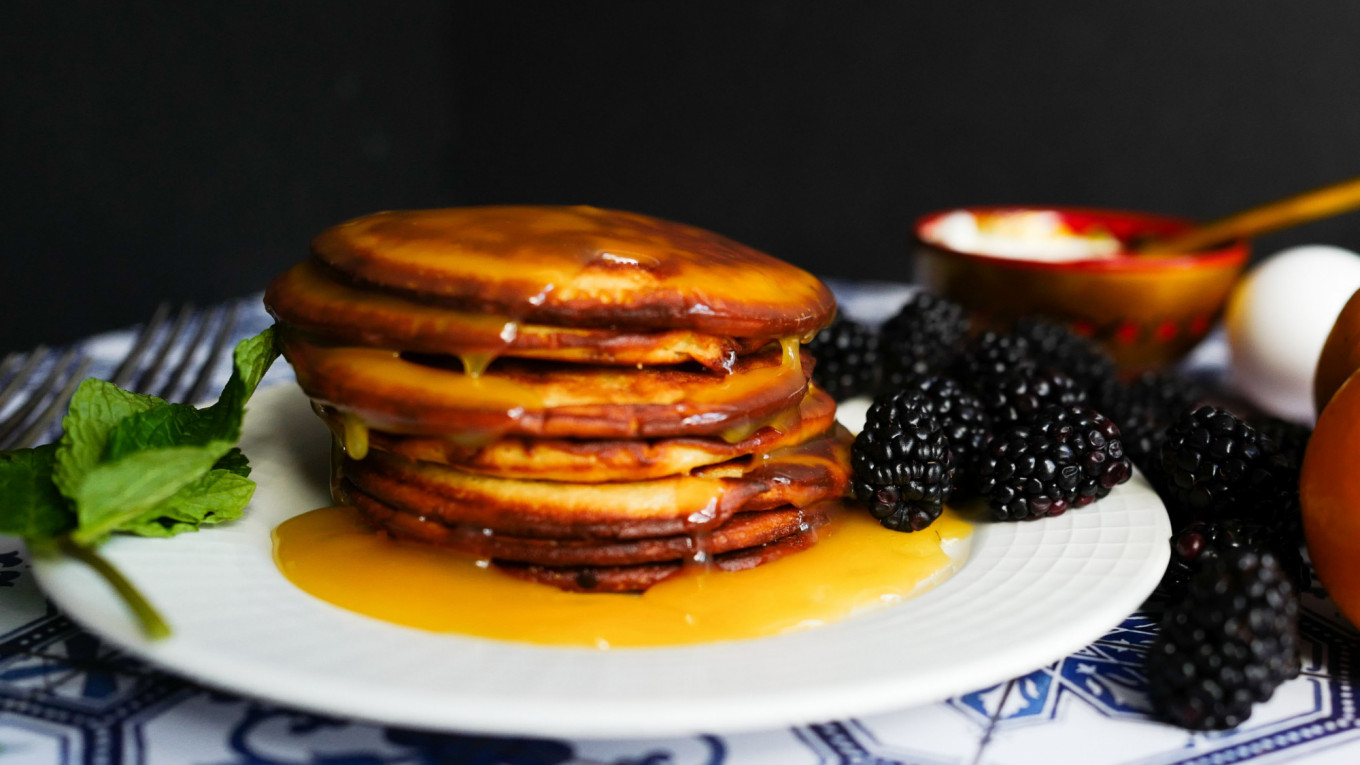It has been an unprecedentedly long, unrelentingly cold, and oppressively dark winter. And while spring may still be a ways away, this week I caught subtle hints of its eventual arrival: an unexpected shaft of amber afternoon light; optimistic early morning birdsong; and a slight softening of the air on my face, as if I’d swapped out a flannel pillowcase for a cotton one. These small moments make me hopeful that the seemingly permanent grimy piles of snow will eventually melt, and huge bouquets of daffodils and mimosa will transform the dark grey corners of the city to brilliant yellow.
For millennia, Maslenitsa, Russia’s weeklong Shrovetide, has harnessed this yearning for warmth, light, and color into a vibrant festival of fire, food, and fun, which is just what the world needs right now — within acceptable social distancing guidelines, of course.
In Russia, where winter lasts almost half of the year, spring is a miraculous season of transformation and renewal. Russians take this seriously: spring is a miracle, yes, but one that needs to be coaxed, wooed, and lured as one might a reluctant lover or long-lost friend. And this is what is at the heart of Maslenitsa: in common with their Eastern European and Scandinavian neighbors, Russia’s celebration of Shrovetide is a passionate plea to the sun to return to earth, staged on a set still dressed for snowy winter. Like its southern cousins, Carnival and Mardi gras, Maslenitsa is also a time to eat lots of rich, buttery foods — the holiday takes its name from “maslo” or butter — and using up all of the butter, cheese, milk, cream, and other dairy products before the long forty-day Lenten Fast, during which these are forbidden.
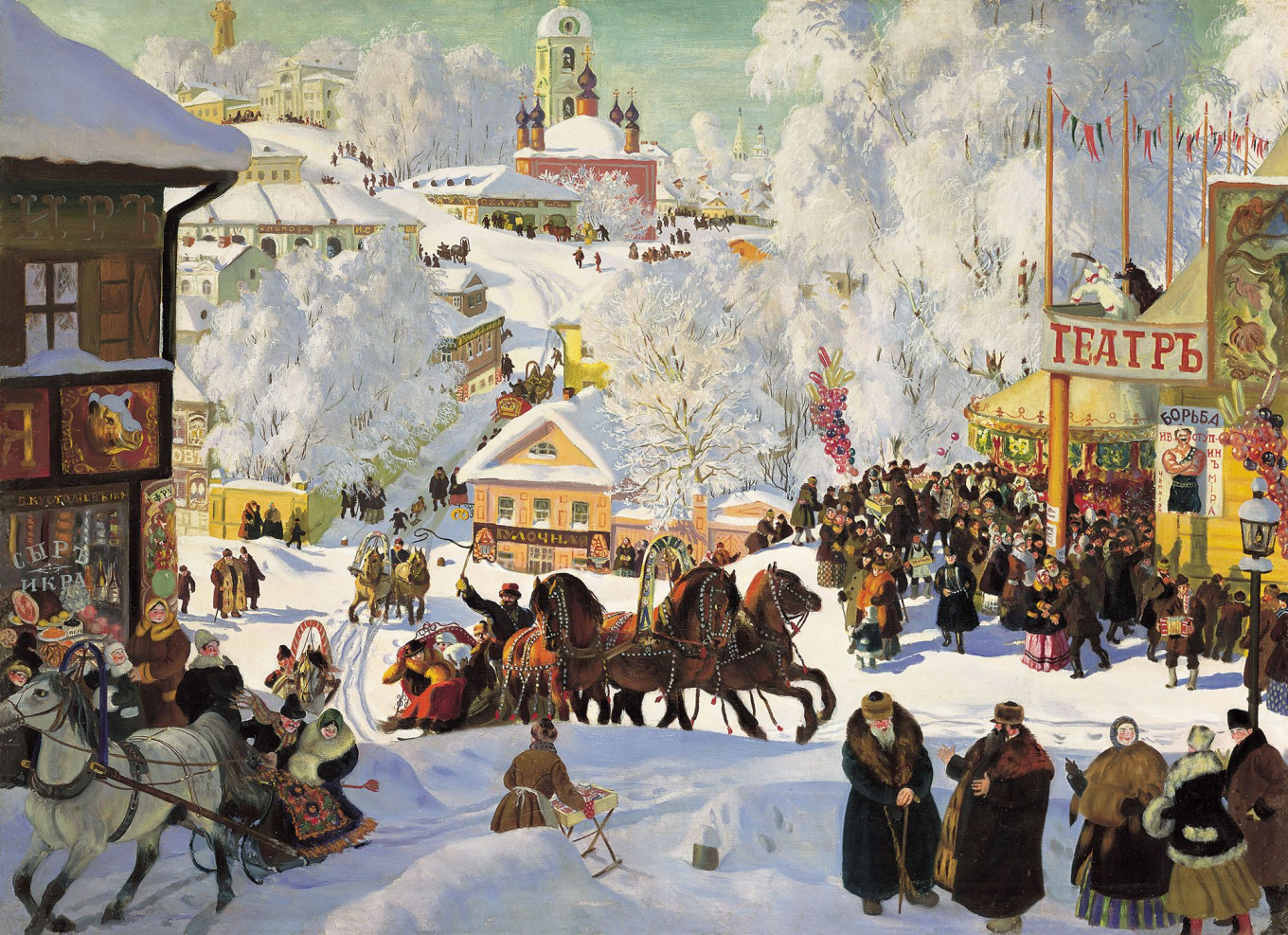
Almost anything goes during “Shirokaya Maslenitsa!” meaning “wide” or “broad” Maslenitsa — an explicit invitation to take full advantage of the “Laissez les bons temps rouler” nature of the holiday.
Maslenitsa’s origins are robustly pagan; its thin veneer of Orthodox Christianity is barely there, and this most resilient of Russia’s traditional holidays survived the virulently anti-religious Soviet era almost unscathed. Maslenitsa celebrations then, as now, reference the ancient tradition of joyfully welcoming the pagan god Yarilo back from the underworld, where he has languished during winter, and urging him to remain on earth with his promise of sun, spring, and fertility. During this week-long festival, fist fights and tug of war contests are common, as are the construction of large snow mountains and sledding parties, and on the last day, a large straw figure of rosy-cheeked Maslenitsa is burned in effigy in a symbolic funeral for winter. Throughout the festivities, there is heavy emphasis on everything solar and anything circular: troika races around the perimeter of a town, joyful circle dances, and folk songs, which celebrate butter, cheese, and that roundest of all sun-like treats: the pancake!
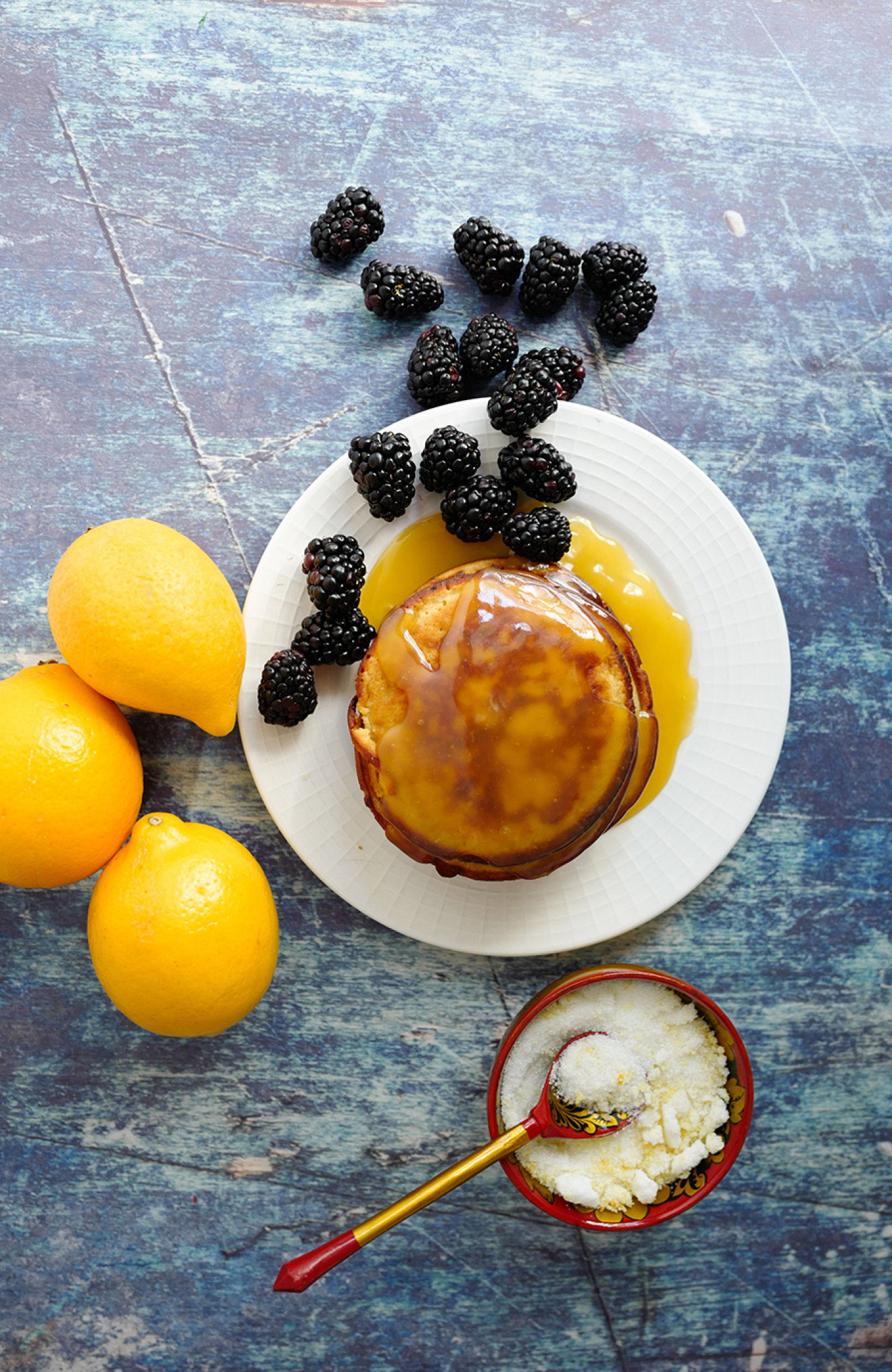
“Shine the sun’s light brighter,
Don’t become diminished.
We have sweet mead for you.
We have pancakes for you!”
Nothing evokes the jocular and jovial atmosphere of Maslenitsa more than the hiss of buttery batter hitting a hot skillet and the warm, yeasty smell that wafts through the frosty air. During Maslenitsa, families host each other for pancake parties, and pancake stations spring up at markets, in parks, and on street corners, where rosy-cheeked vendors sell their yeasty confections hot off the griddle, then stuff them with every imaginable filling from sticky sweet to rich and savory.
Pancakes are potent symbols in Russian culture: an important dish during of joyful times as well as somber ones. Round and yellow like the sun itself, pancakes symbolize solar warmth and energy at the end of winter, but are also important during Russian funerals, where they console the mourners with the promise of eternal life, while also reminding them that life on earth requires sustenance. When pancakes are wrapped around jam, mushrooms, smoked fish, or caviar, they are also reminiscent of a funeral shroud, as Igor Klekh notes in his wonderful collection of culinary-inspired essays, “Adventures in a Slavic Kitchen.”
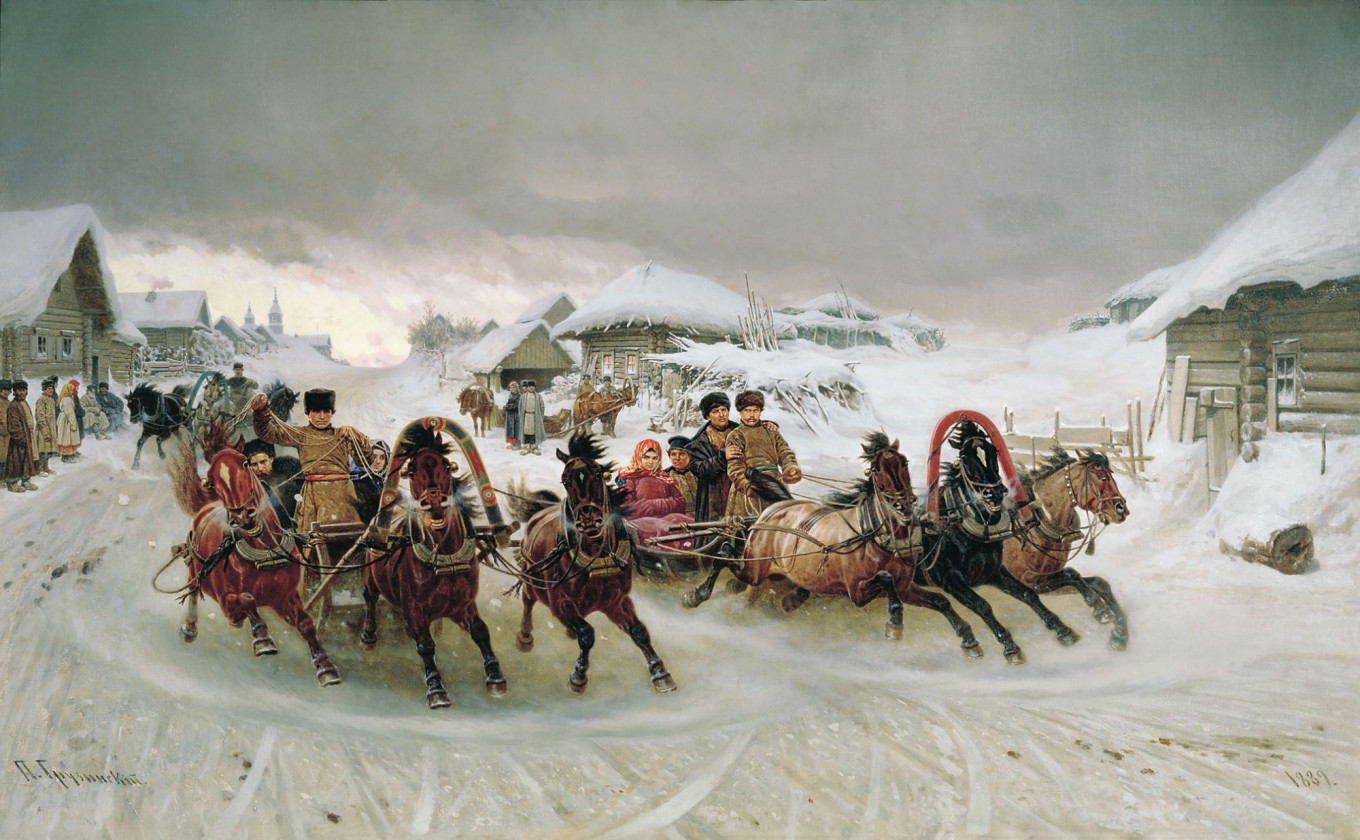
A few years ago in this column, I featured my favorite recipe for classic buckwheat blini, which are the more common pancake during Maslenitsa. This is one of those recipes that is liberally splattered with the batter of many Maslenitsas (and sadly of a few funerals as well) and stands me in very good stead throughout the year as a perfect accompaniment for cured fish, caviar, and mushroom sauce.
But there is another kind of pancake you may also encounter during Maslenitsa, the thicker, doughier oladi (singular — oladya), which many adults remember with great fondness from their childhoods. These sturdy little pancakes make admirable vehicles for anything sweet: tvorog, jam, chocolate, nuts, maple syrup… but for me, they are ideal with a generous dollop of lemon curd and any kind of fresh berry.
While oladi are traditionally made with yeast, I substitute kefir, which gives them a lovely tangy flavor. I use ricotta to make them pillowy soft. And I love to add lemon juice and lemon zest to these oladi and sprinkle the tops with lemon sugar and serve it with lemon curd. With lots of hot butter, these lemon oladi are the perfect way to use up all the dairy in the house before the asceticism of Great Lent begins— the great raison d’être of Maslenitsa. If you can find Meyer or Uzbek lemons, by all means, use these because the taste is so flavorful. These lemony sweet treats will sustain you until spring comes. And it will. It always does.
May you enjoy your Shirokaya Maslenitsa!

Lemon Oladi
Ingredients
- 1 ½ cup (354 ml) of kefir or buttermilk
- 1 cup (236 ml) ricotta
- 3 large eggs
- 3 tsp unsalted butter, melted, then cooled
- Zest and juice from 1 large lemon, preferably Meyer or Uzbek
- 2 tsp vanilla
- ¾ cup (180 ml) sugar, divided
- 2 cups (475 ml) all-purpose flour
- 2 tsp baking powder
- 1 tsp baking soda
- ½ tsp salt
- Vegetable oil for frying
Instructions
- Whisk together the eggs in a large bowl, then add the kefir, ricotta, vanilla, melted butter, and half the lemon zest and whisk to combine. Add in the ¼ cup (60 ml) sugar and all the lemon juice.
- Sift together the flour, baking powder, baking soda, and salt, then stir them into the liquid ingredients. Do not over-mix.
- Let the batter sit for 30 minutes. Make the lemon sugar by combining the remaining lemon zest with the remaining ½ cup (125 ml) of sugar; rub the two together with clean hands until it takes on the consistency of slightly wet sand. Set the lemon sugar aside.
- Preheat the oven to 200ºF (90ºC) and place a platter or baking sheet inside the oven to keep the oladi warm.
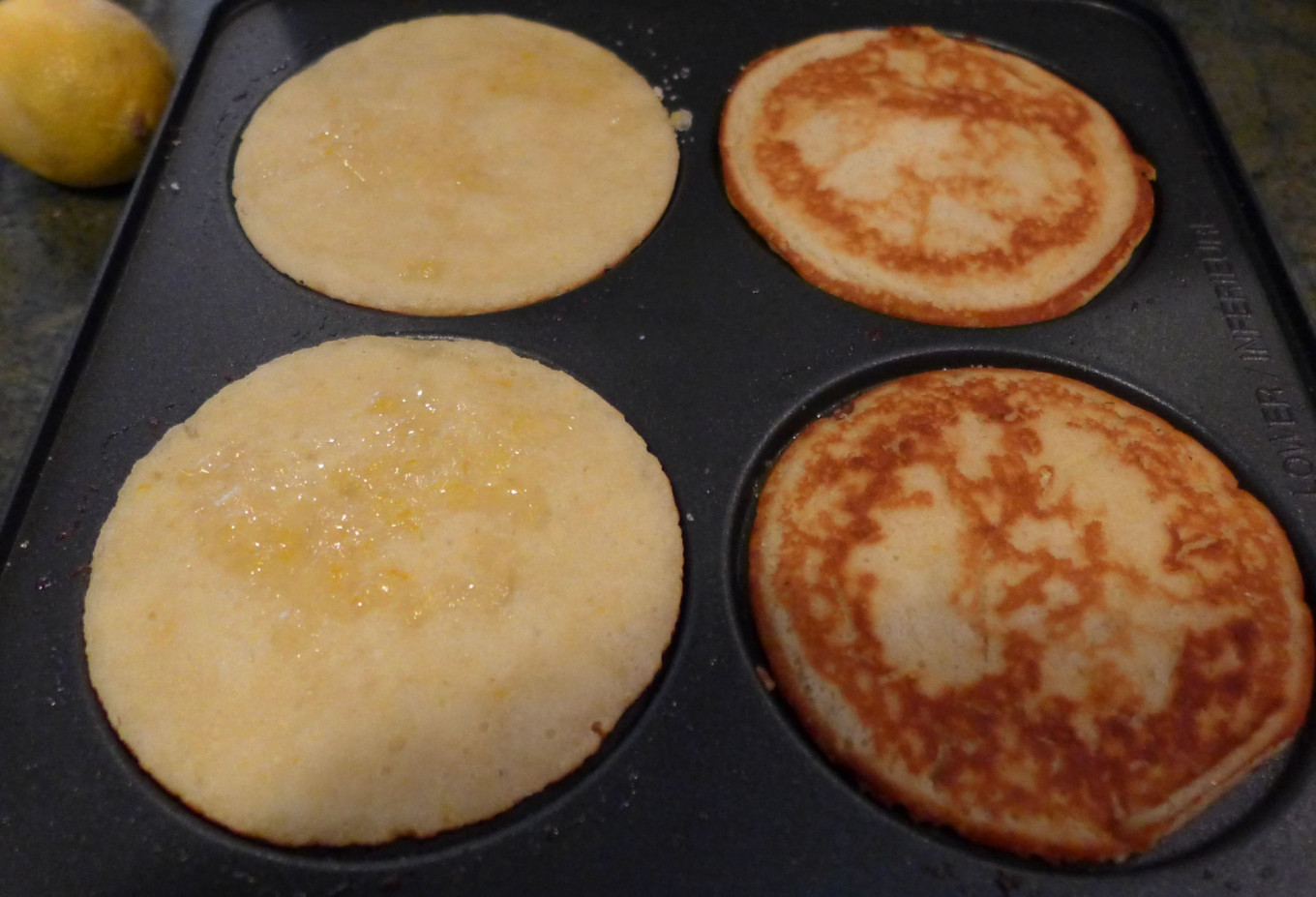
- This batter is quite spongy, so if you have an electric waffle maker with a pancake plate, this is a great time to dust it off and use it, so that you can keep the temperature steady. If not, heat a non-stick skillet over medium heat, then pour a dollop of vegetable oil on the hot skillet and use a paper towel to disperse the oil over the surface.
- Ladle out ⅓ cup (80 ml) of batter onto the skillet, then sprinkle the top side of the oladya with a pinch of the lemon sugar. When the pancake rises and its surface develops air bubble holes (approximately 2 minutes), carefully flip the pancake over and cook for another 2 minutes. Remove the oladya to the oven until you are ready to serve. Top the oladi with the remaining lemon sugar and serve with jam or lemon curd.
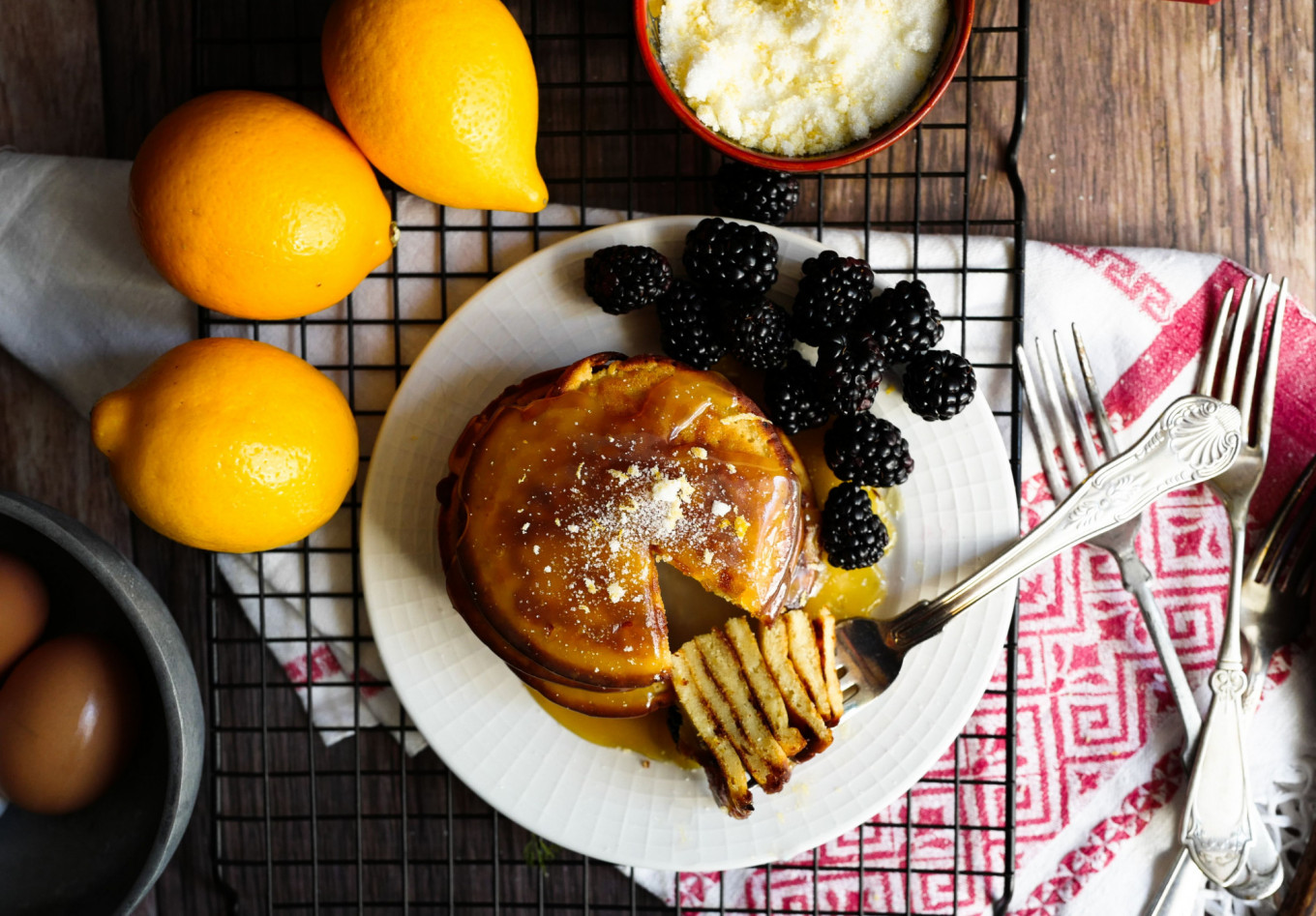
A Message from The Moscow Times:
Dear readers,
We are facing unprecedented challenges. Russia's Prosecutor General's Office has designated The Moscow Times as an "undesirable" organization, criminalizing our work and putting our staff at risk of prosecution. This follows our earlier unjust labeling as a "foreign agent."
These actions are direct attempts to silence independent journalism in Russia. The authorities claim our work "discredits the decisions of the Russian leadership." We see things differently: we strive to provide accurate, unbiased reporting on Russia.
We, the journalists of The Moscow Times, refuse to be silenced. But to continue our work, we need your help.
Your support, no matter how small, makes a world of difference. If you can, please support us monthly starting from just $2. It's quick to set up, and every contribution makes a significant impact.
By supporting The Moscow Times, you're defending open, independent journalism in the face of repression. Thank you for standing with us.
Remind me later.



